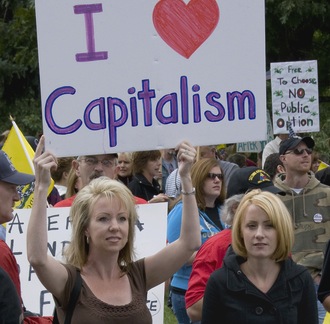
Many people criticize policies and elected officials based on strong support for what they believe to be free market capitalism. But do these people actually understand capitalism? What they believe to be capitalism: getting the government off the back of the private sector, is not true free market capitalism.
Adam Smith, the man many in the conservative arena espouse to be the father of modern capitalism, was an 18th century economist who wrote an influential book called The Wealth of Nations. In it, he argues three main tenets. These principles have become the standards by which capitalism, as we know it (and many peoples’ level of acceptance of it) is measured.
The first is the invisible hand. Smith argued that there is an invisible force at play in the market that guides production. So, the argument goes, if citizens want to live in a society with all solar power and organic food, they would simply put their money where their mouth is, and buy only those goods. By creating that market demand, people incentive companies to produce only those kinds of goods, and nothing that is bad for society, like coal. As a result, the invisible hand has worked its magic: our society is now 100% solar powered and full of nutritious, non-GMO food.
The second principle Smith espoused is that the free market alone should determine the types and quantities of goods and services (meaning that government should never make those decisions).
His third principle was that, if all individuals were striving for their own self-interest, that cumulatively, those efforts would have the greatest overall good for society. By working really hard, these folks would create economic opportunities for themselves and others, and that provided the best overall benefit.
Present day followers of Adam Smith’s theories often call their opponents socialists when those opponents try to regulate the market, impose some sort of checks and balances on bad behavior, or impose taxes on things like cigarettes, soda, etc. The Adam Smith Foundation even popped up out of nowhere about 2 years ago, and consistently pushes for what it interprets as policies that Adam Smith would approve of. Here’s a screen shot of a google search for the Adam Smith Foundation (you will note their opposition to “job-killing” measures, a common communications strategy used by politicians against any sort of “public good” legislation, like health care and the environment).
Smith’s theories were groundbreaking…for the 18th century. In the 18th century, there were less than 1 billion people on earth, and resources like wood, coal, land, clean water, and others likely seemed limitless. If Smith lived today, his theories would likely have taken into account three main sources of free market failure:
- Externalities. Externalities are costs associated with something that are not paid for by that something. If, for instance, you are in manufacturing, and one of your byproducts is a toxic sludge, what is the least expensive thing you can do with that sludge? Dump it in a river. Problem solved. Well, sort of. The people living downstream might have something to say, and anyone who was making a living by fishing from that river now has no job. The most obvious externality is pollution and public health. Coal, for instance, has substantial externalities. In America, we subsidize coal’s externalities to the tune of $345-$500 billion per year in health costs, including 600,000 cases of brain damage in infants, 10 million asthma attacks, and 43,000 premature deaths. If coal had to INTERNALIZE those costs into its business model, electricity generated from coal would cost 3x more than wind power (even including the externalities of wind power, of which there are some, but far fewer than coal). Other examples of externalities include childhood obesity from processed junk food and fast food, food allergies, child labor (because it robs society of educated adults), antibiotic resistant bacteria like MRSA (which is a byproduct of factory farms, but is paid for, massively, through public health costs), and end-of-life disposal. End-of-life disposal, in the case of toxic products like electronic waste or nonbiodegradable products like plastic, cost society a lot of money to clean up. Many municipalities around the world are passing Extended Producer Responsibility Laws to encourage companies to design products with less toxic after-life effects, and the results are excellent.
- Tragedy of the Commons. This is a phenomenon where, if no one is governing the use of a common resource, then what is to stop companies from exploiting it to its fullest? This kind of unsustainable harvest can lead to the collapse of that resource, driving others bankrupt, and robbing future generations from using that resource. Consider the Atlantic Bluefin Tuna. The tuna range across three continents, and fishing boats can reach them in international waters pretty much anywhere. In other words, it’s a “common” resource between many peoples and governing bodies. What’s to stop an American company from harvesting tuna that might otherwise have migrated to Africa and been harvested there? Right…nothing. In an unregulated market, the common resource is depleted beyond its ability to replenish itself, and eventually collapses. If harvested sustainably, short term profits for those competing companies might be less, but in the long term, jobs continue, people are fed, and future generations can enjoy the fish as well. Tragedy of the commons can go for any common resource: migrating populations, forests, ozone layer, air quality, water quality, etc. etc.
- Information asymmetry. Adam Smith’s theories only hold water if everyone involved has equal access to information on which to make decisions relevant to the market. Wall Street’s “creative” bundling of mortgage backed securities, coupled with their cozy relationship to credit rating agencies, gave investors a false read on how risky the investments were. The bankers walked away with billions, and investors were left holding the bag. If the rating agencies (like Moody’s) were doing their jobs, they would never have allowed the financial house of cards that lead to the collapse of the world economy in 2008. As a result many people are left to figure out what credit repair companies to hire for their accounts.
The new world of sustainable business is one in which we work to include these facets in capitalism. It’s only fair…if a company is creating a mess, they should pay for it. If they can’t pay for it, they should get into a new line of work and make money without externalizing their costs onto the people, other companies, or taxpayers.
The power of real capitalism, where companies are responsible for their costs (all of their costs) and are not allowed to game the system, is astounding. Business is great at reducing costs. Rules like cap and trade level the playing field, and give companies the opportunity to compete in a system where everyone has to consider the costs of their pollution on society. Once they do, they reduce those costs, as well as the pollution and public health detriment that goes along with it. Remember acid rain? In the 1980’s, acid rain was one of the most pressing environmental issues we faced. Forests along the eastern seaboard of the United States were dying, hurting timber industry, wildlife, public health, and becoming a major fire hazard. The cause was certain kinds of emissions from power plants, mostly SOx and NOx. Once the government stepped in and created a cost for those pollutants, across the board so that all companies had to deal with their externalities as an internalized cost, the issue resolved itself. Who talks about acid rain anymore? The free market solved an environmental crisis–all because it had an accurate cost mechanism and a level playing field.
“Free market capitalism is the best thing that could happen to our environment, our economy, and our country.” -Robert Kennedy, Jr.
“I believe totally in a capitalist system. I only wish someone would try it sometime.” -Arriana Huffington
Follow Scott Cooney on Twitter
Photo from Shutterstock




I fear you’ve been reading opinions of Neoclassical economists who emphasise Smith’s invisible hand, which is only mentioned *once* in the Wealth of Nations.
I don’t think there is any merit to attribute Smith as the source of the “Invisible Hand” theory, or laissez faire economics.
Below, Gavin Kennedy addresses the subject of Smith’s invisible hand.
http://adamsmithslostlegacy.blogspot.com/2012/09/0-false-18-pt-18-pt-0-0-false-false_23.html
The”invisible hand” was a metaphor in Wealth Of Nations (1766) for “insecurity” felt by some, but not all merchants, “leading” them to prefer “domestic industry” to their perceived risks of “foreign” trade. The metaphor of “an invisible hand” described that motivation in a “more striking and interesting manner”, as expressed by Adam Smith on the role of metaphors in his “Lectures On Rhetoric and Belles Lettres” (1763, p 29).)
Awesome article!
Externalities problem is a straw man, solved by protection of private property. Tragedy of the commons is solved by having no public property, only private property. Information asymmetry is a red herring. People make decisions relative to their personal desires and value is subjective. no one knows more about her own desires and the relative valuations of those desires than that person. You also used an example where government interference in the market for housing contributed the most to those bad loans being bundled and to the monopoly grant for ratings for those rating companies. Your explanation in the asymmetry point makes the case for getting government OUT of the market, not for government intervention IN the market.
No public property?
Are you serious?
Ever heard of natural monopolies?
Ground/Soil is one of these. Or Infrastructure.
Giving private entities sole ownership of these does end with them reprieving as much revenue (rent) from other entities for access to them as possible.
And a sustainable management of such resources is not guaranteed under such a scheme at all and there is a very big chance the whole society will become distorted.
And then we have artificial monopolies like legal tender, patents or knowledge.
I suggest reading some Keynes or Gesell on those matters.
The problem is that all three of these flaws are in various ways unavoidable: the products of sheer physics or the human condition.
Take externalities. If you pass the costs onto people who have no way of knowing they’re being expoited, then there’s no way to control it.
Same for tragedy of the commons. The big thing about the ocean is that no one owns it NOR can you assign ownership. It’s talked about all the time. If there was a King Poseidon/Neptune who could react to this, this is one thing, but who owns the sea?
And finally, information asymmetry. That goes to both the human condition and the simple fact humans aren’t omniscient. There will ALWAYS be insiders, and as long as there are insiders, they will find ways to exploit their insider knowledge to get around restrictions and so on and profit from that knowledge. It’s basic human competition: instinct.
Free market is not perfect, just better. All the problems you mention already exist under our state-controlled paradigm, with the extra downside of being almost impossible to oppose any state-sponsored “solution.” The result is the regulatory madness we have today, captured by the big corporations, and against which we are impotent.
Externalities – absolutely. But regulation, taxes and subsidies can solve the problem of externalities. TOTC is actually solved by privatization and capitalism, whereas it’s created by communal ownership. Information asymmetry is something that exists no matter what economic system you use. There is no greater information asymmetry than some planner in a distant capital and you trying to run your business. This article is feeble – surely there are better critiques of capitalism.